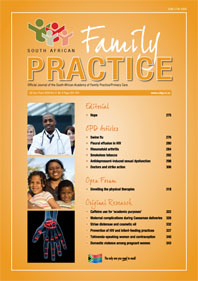Second Stage Primary Caesarean Deliveries: Are Maternal Complications Increased?
Keywords:
caesarean sections, second stage labour, complications
Abstract
Background: Second-stage Caesarean sections (CSs) are known to be associated with increased complications but most reports originate from tertiary hospitals, which attend to high-risk patients. Complication rates may differ in district hospitals, which attend to low-risk patients. Methods: This was a retrospective study carried out at a district maternity unit in Durban. The hospital records of all CSs over an eight-month period were reviewed and obstetric and neonatal complications of second-stage CSs were compared with a group of first-stage CSs performed during the study period. Results: There were 4 654 deliveries, including 1 257 CSs, in the study period. The CS rate was 27.2%. Of 617 (8.5%) emergency CSs, 53 were performed in the second stage of labour. The maternal and neonatal complication rates were low and no statistical differences were found between the patients who had second-stage or those who had first-stage CSs, except for increased blood loss, blood-stained urine, prolonged operative times and postoperative fever for secondstage CSs. Conclusions: Second-stage CSs performed in a district hospital are associated with increased maternal complication rates but not with neonatal complications.
Published
2009-05-16
Section
Original Research
By submitting manuscripts to SAFP, authors of original articles are assigning copyright to the South African Academy of Family Physicians. Copyright of review articles are assigned to the Publisher, Medpharm Publications (Pty) Ltd, unless otherwise specified. Authors may use their own work after publication without written permission, provided they acknowledge the original source. Individuals and academic institutions may freely copy and distribute articles published in SAFP for educational and research purposes without obtaining permission.

